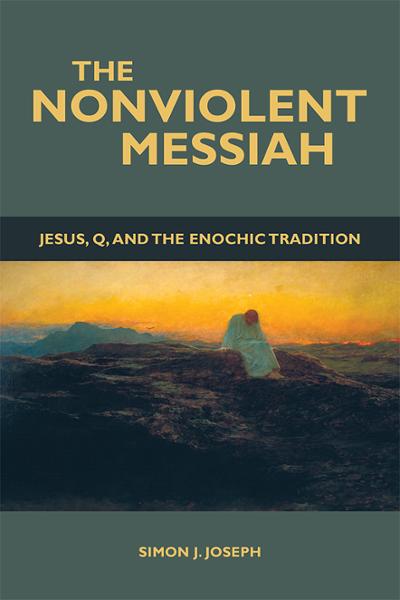When scholars have set Jesus against various conceptions of the “messiah” and other redemptive figures in early Jewish expectation, those questions have been bound up with the problem of violence, whether the political violence of a militant messiah or the divine violence carried out by a heavenly or angelic figure. Missing from those discussions, Simon J. Joseph contends, are the unique conceptions of an Adamic redeemer figure in the Enochic material—conceptions that informed the Q tradition and, he argues, Jesus’ own self-understanding.
- Format Paperback
- ISBN 9781451472196
- eBook ISBN 9781451484434
- Pages 240
- Dimensions 6 x 9
- Publication Date June 1, 2014
Endorsements
"In his bold new book, Simon Joseph confirms what many have suspected for some time: Jesus was completely, consistently, and incontrovertibly nonviolent. Joseph serves as a reliable guide through a plethora of ancient sources and the tangle of modern scholarship to get us as close as possible to the earliest Jesus traditions. His book is meticulously researched and graciously argued. From this point forward, nobody can suggest Jesus was violent without first contending with the very formidable evidence Joseph has mounted to the contrary. A much needed book!"
—Eric A. Seibert
Messiah College
"This is an all too rare attempt to integrate scholarship on Second Temple Judaism with the study of the historical Jesus."
—John J. Collins
Yale Divinity School
“The Nonviolent Messiah offers a new understanding of the term 'messiah,' a remarkable feat in itself. The book should be required reading for all serious students of the historical Jesus, especially those interested in the study of Jesus as messiah, Son of Man, the New Adam, and the herald of God’s eschatological Jubilee.”
—James A. Sanders
Professor emeritus, Claremont School of Theology and Claremont Graduate University
"Simon Joseph provides a helpful new entry into understanding the peaceable way of Jesus. By drawing on heretofore underutilized sources, Joseph underscores that nonviolence should be central to our evaluation of what constituted the message of the historical Jesus. This massively researched and clearly written study makes Jesus's message of peace available in fresh and helpful ways."
—Ted Grimsrud
Eastern Mennonite University
"Did Jesus promote apocalyptic violence or nonviolent social reform? Or do these categories lead us astray? Revisiting the social, cultural, and theological matrices of Second Temple Judaism, Simon Joseph offers us the finest book to date on the topic of Jesus and nonviolence. Joseph’s findings will incite controversy, but this book is a discerning and compelling look at Jesus' earliest socio-political message."
—Anthony Le Donne
Author of The Historiographical Jesus: Memory, Typology, and the Son of David and The Wife of Jesus: Ancient Texts and Modern Scandals
"Simon's book argues—powerfully and persuasively—that first common-era century Judaism evoked both a violent and a nonviolent messianic option. Furthermore, the work shows that Jesus deliberately and self-consciously chose that latter alternative even unto martyrdom. After this book’s challenge, the debate is no longer the Jesus of History or the Christ of Faith. It is now whether, be it as Jesus in academy or Christ in church, that figure is one of violent or nonviolent resistance to inequality, injustice, and oppression."
—John Dominic Crossan
Emeritus, DePaul University
—Eric A. Seibert
Messiah College
"This is an all too rare attempt to integrate scholarship on Second Temple Judaism with the study of the historical Jesus."
—John J. Collins
Yale Divinity School
“The Nonviolent Messiah offers a new understanding of the term 'messiah,' a remarkable feat in itself. The book should be required reading for all serious students of the historical Jesus, especially those interested in the study of Jesus as messiah, Son of Man, the New Adam, and the herald of God’s eschatological Jubilee.”
—James A. Sanders
Professor emeritus, Claremont School of Theology and Claremont Graduate University
"Simon Joseph provides a helpful new entry into understanding the peaceable way of Jesus. By drawing on heretofore underutilized sources, Joseph underscores that nonviolence should be central to our evaluation of what constituted the message of the historical Jesus. This massively researched and clearly written study makes Jesus's message of peace available in fresh and helpful ways."
—Ted Grimsrud
Eastern Mennonite University
"Did Jesus promote apocalyptic violence or nonviolent social reform? Or do these categories lead us astray? Revisiting the social, cultural, and theological matrices of Second Temple Judaism, Simon Joseph offers us the finest book to date on the topic of Jesus and nonviolence. Joseph’s findings will incite controversy, but this book is a discerning and compelling look at Jesus' earliest socio-political message."
—Anthony Le Donne
Author of The Historiographical Jesus: Memory, Typology, and the Son of David and The Wife of Jesus: Ancient Texts and Modern Scandals
"Simon's book argues—powerfully and persuasively—that first common-era century Judaism evoked both a violent and a nonviolent messianic option. Furthermore, the work shows that Jesus deliberately and self-consciously chose that latter alternative even unto martyrdom. After this book’s challenge, the debate is no longer the Jesus of History or the Christ of Faith. It is now whether, be it as Jesus in academy or Christ in church, that figure is one of violent or nonviolent resistance to inequality, injustice, and oppression."
—John Dominic Crossan
Emeritus, DePaul University
